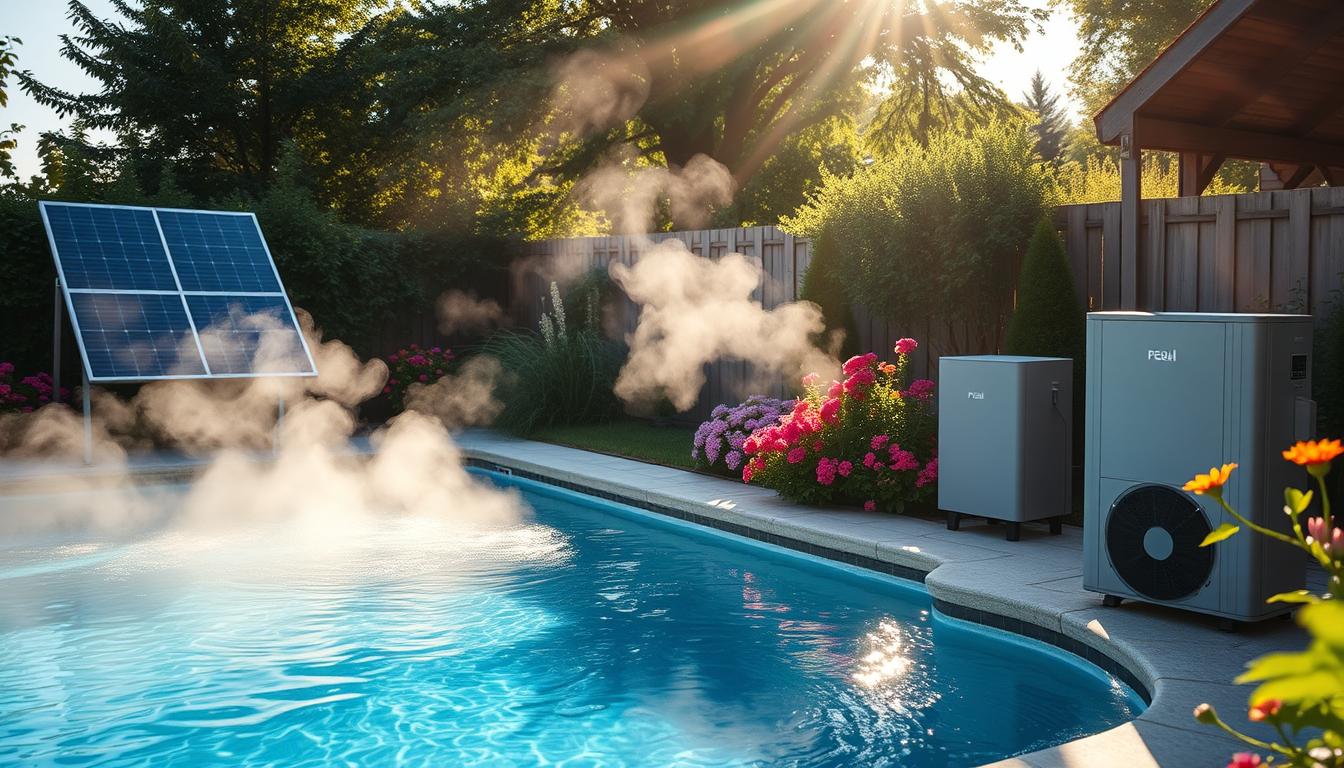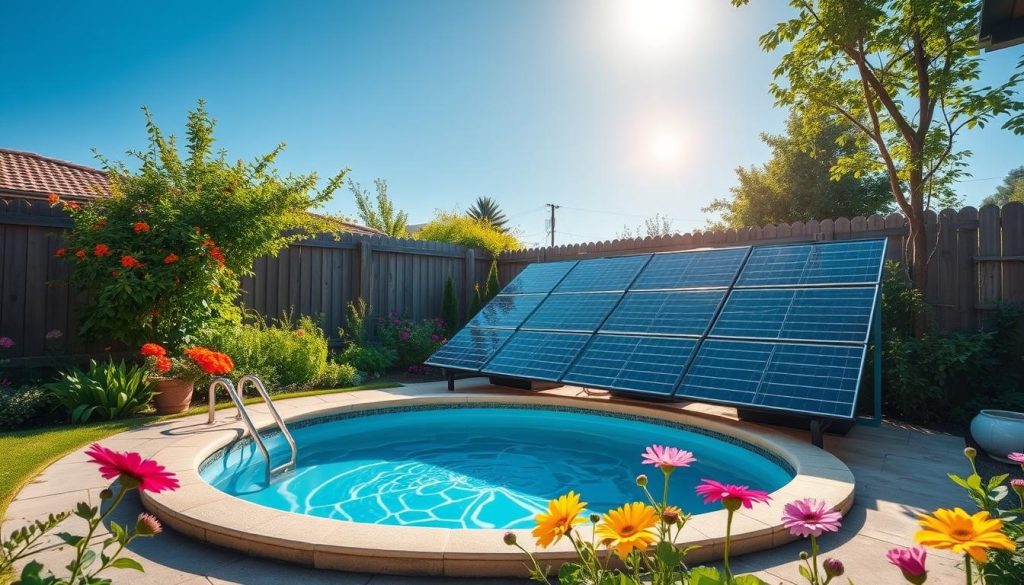
Summer’s coming, and we’re eager to cool off in our pools. But cold water can be off-putting. Pool heating solves this problem. It lets us swim comfortably even in cooler weather. Let’s explore how long it takes to heat a pool and the best methods.
Pool owners need to know about heating options and times. Gas heaters warm pools quickly. Heat pumps are energy-efficient. Solar systems are eco-friendly. Each method has its pros and cons.
Many factors influence pool heating time. These include pool size, desired water temperature, and air temperature. Understanding these helps us make smart choices about pool heating.
We’ll look at different heating technologies in the following sections. We’ll also discuss factors affecting heating time. Plus, we’ll provide a guide on heating times for various pool sizes.
This information will help you choose the best heating solution. You’ll be able to enjoy a comfortable pool temperature all season long.
Understanding Pool Heating Technologies
Pool heating systems come in three main types. These are gas pool heaters, electric pool heaters and heat pumps, and solar pool heating systems. Each has its own pros and cons to consider.
Gas Pool Heaters
Gas pool heaters are quick and powerful. They use natural gas or propane to heat pools fast. This makes them great for colder areas or when you need rapid heating.
The heater burns fuel in a combustion chamber. It then transfers heat to the pool water as it flows through. Gas heaters work fast but can cost more to run due to fuel prices.
Choose a gas heater with high energy efficiency. Make sure it’s the right size for your pool volume to get the best results.
Electric Pool Heaters and Heat Pumps
Electric pool heaters and heat pumps are energy-efficient options. Heat pumps move heat from the air to your pool water. They cost less to run than standard electric heaters.
Heat pumps work best in warmer air temperatures. They may heat slower than gas heaters. Electric resistance heaters warm water directly but cost more to operate.
When picking an electric heater or heat pump, look at energy ratings. Consider size and how it fits with your current pool system.
| Heating Technology | Heating Time | Energy Efficiency | Operating Costs |
|---|---|---|---|
| Gas Heater | 8-12 hours | Lower | Higher |
| Electric Heater | 12-24 hours | Moderate | Higher |
| Heat Pump | 24-48 hours | Higher (up to 600% efficient) | Lower (up to 80% savings) |
Solar Pool Heating Systems
Solar pool heating systems offer an eco-friendly, cost-effective choice. They use the sun’s energy to warm pool water through solar collectors. This method works best in sunny regions and can greatly reduce energy costs.
Solar heating may be less effective in cold climates or during cloudy periods. When choosing a solar system, consider collector size, pool size, and local weather patterns.
Solar heaters use the sun’s energy for pool heating and are environmentally friendly.
Factors Affecting Pool Heating Time
Several key factors influence how long it takes to heat your pool. Understanding these can help you optimize your pool heating system’s performance.
Knowing these factors will help you make smart choices about your pool heating. You’ll be able to create a comfortable swimming experience more easily.
Pool Size and Volume
The size and volume of your pool greatly affect heating time. Larger pools need more energy and time to heat than smaller ones.
Here’s a general guideline for heating times:
- Small pools (up to 14,500 gallons) may take 24-72 hours to heat from scratch
- Medium-sized pools (14,500-30,000 gallons) may take 48-96 hours
- Large pools (over 30,000 gallons) may require 72-120 hours
These estimates can vary based on other factors. These include desired water temperature, air temperature, and heating system capacity.
Desired Water Temperature
Your target water temperature affects heating time and energy use. Higher temperatures need more time and energy to reach and maintain.
The ideal pool temperature is usually between 78°F to 82°F (26°C to 28°C). This can vary based on preference and pool activities.
Balance comfort and energy efficiency when setting your pool temperature. Even a small increase can lead to higher energy use over time.
| Desired Water Temperature | Gas Heater Heating Time | Electric Heat Pump Heating Time | Solar Heater Heating Time |
|---|---|---|---|
| 75°F (24°C) | 8-16 hours | 16-24 hours | 24-36 hours |
| 80°F (27°C) | 10-20 hours | 20-32 hours | 32-48 hours |
| 85°F (29°C) | 12-24 hours | 24-36 hours | 36-52 hours |
Ambient Air Temperature and Weather Conditions
Air temperature and weather greatly impact pool heating. Colder climates or low temperatures make heating take longer and use more energy.
Wind and humidity also cause heat loss from the pool’s surface. This affects heating efficiency.
Using a pool cover can reduce heat loss by up to 70%. This helps your heating system work better and use less energy.
Investing in a quality pool cover is one of the most cost-effective ways to optimize your pool heating system and reduce energy costs in the long run.
Consider these factors when setting up your pool heating. You’ll create a cozy swimming spot while using less energy and heating time.
How Long Does It Take to Heat Up a Pool?
Heating a pool takes different amounts of time. The pool’s size, desired water temperature, and heating method all play a role. Let’s explore heating times for various pool sizes.

Heating Time for Small Pools
Small pools of up to 55,000 liters heat in 24 to 72 hours. Factors like desired temperature and air temperature affect heating time. For best results, use the heating system non-stop with a pool cover.
Heating Time for Medium-Sized Pools
Medium pools of 55,000 to 115,000 liters need 48 to 96 hours of heating. Starting water temperature and system efficiency impact heating time. Daily heating of 12-16 hours maintains temperature in medium pools.
Heating Time for Large Pools
Large pools over 115,000 liters require 72 to 120 hours of heating. This process can be energy-intensive and time-consuming. Use a high-performance heat pump or combined methods for efficient heating.
| Pool Size | Volume (liters) | Heating Time (hours) | Energy Required (kWh) |
|---|---|---|---|
| Small | Up to 55,000 | 24-72 | 638-1,914 |
| Medium | 55,000-115,000 | 48-96 | 1,276-3,828 |
| Large | Over 115,000 | 72-120 | 2,552-5,220 |
This table shows heating times and energy needs for different pool sizes. It assumes a 10°C temperature increase and 5 COP heat pump efficiency. Remember, these are estimates and may vary based on specific conditions.
Maximizing Pool Heating Efficiency
Boost your pool heating system’s efficiency with smart strategies. A well-fitted pool cover can reduce heat loss by up to 70%. This allows the heating system to work better and use less energy.
Regular maintenance is key for optimal performance. Clean or replace filters, check water flow, and schedule annual professional inspections. These steps help keep your pool running smoothly.
Set a consistent temperature for your pool. Run the heating system during the warmest parts of the day. This approach minimizes energy consumption and keeps costs down.
Solar covers can keep pool water up to 10 degrees warmer. Solar sun rings are five-foot inflatable vinyl circles that absorb heat from the sun. These tools help reach desired pool temperatures efficiently.
Liquid solar pool covers create an invisible barrier to reduce evaporation. They also prevent heat loss in pools. Windproof pool enclosures keep pools warm in windy areas.
Combine a solar cover or solar rings with a pool heat pump. This method heats pools fast and maintains comfortable temperatures. By using these strategies, you’ll enjoy a warm pool all season.







